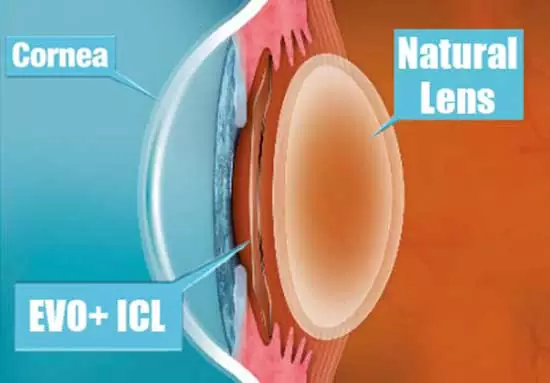ICL (Implantable Collamer Lens)

LASIK Eye Surgery today is a safe and effective method of correcting nearsightedness, farsightedness and astigmatism for the vast majority of patients seeking Laser Vision Correction of their refractive eye conditions. In fact, LASIK surgery is by far the most common procedure to help those wishing to eliminate their dependence on eyeglasses and contact lenses. However, for some patients who are extremely nearsighted or myopic, those that have thin corneas or those that have other conditions that might predispose them to complications with LASIK, another alternative might be to find out if they are good candidates for Implantable Lenses to correct their vision. One such lens is the Verisyse Phakic Intraocular Lens and another is the VisianT Implantable Collamer Lens (ICL).

Benefits Of Implantable Collamer Lens(ICL)
It can fix severe nearsightedness that can’t be corrected with other surgeries.
The lens is less likely to cause dry eyes, which is ideal if your eyes are chronically dry.
People who can’t get laser eye surgery might be good candidates for ICL.
The lens provides great night vision.
Recovery is usually quick because tissue isn’t removed.
It’s meant to be permanent but can be removed.
Precautions Of ICL Surgery

ICL surgery isn’t safe for everyone. When considering the procedure, talk to a doctor to determine if it’s right for you.
The surgery may not be a good choice if you:
• are pregnant or breastfeeding
• are younger than 21 years old
• are 45 and older
• have a chronic disease that causes hormone fluctuations
• are taking medicine associated with vision changes have a condition that Your doctor can explain the best safety measures for your situation
• inhibits proper wound healing
• don’t meet the minimum requirements for endothelial cell count.
Before the surgery, you’ll also need to take other precautions.
For example, you’ll have to stop wearing contact lenses in the weeks leading up to the procedure.


- Good-to-excellent far vision without contact lenses or glasses.
- The IOLs are removable.
- Reduced risk of glare, halos, or problems with low lighting that can result from high laser treatments.
- The natural lens is not removed, which means that the near focusing ability of the eye is preserved in patients under 40-years old.
In the phakic IOL procedure, an intraocular lens (IOL) is placed inside the eye but the patient’s natural lens is not removed. The lens may be placed in front of or behind the iris, or may be secured to it. Phakic lens implants are a safe, effective option for patients who have high myopia (good near vision and poor distance vision), or who have thin corneas that are unsuitable for laser eye surgery. Unlike Refractive Lens Exchange (RLE), the natural focusing ability of the eye remains because the natural lens is left unaltered, and the procedure is reversible.
Phakic intraocular lenses (IOLs) are a type of implantable lens that can be used to correct refractive errors such as high myopia. High myopia is a condition where the eye is longer than normal, causing light to focus in front of the retina instead of on it, resulting in blurry vision. Phakic IOLs work by adding an additional lens in front of the eye’s natural lens to help focus light correctly.
Phakic IOLs are typically recommended for individuals with high myopia who are not good candidates for laser vision correction procedures such as LASIK or PRK. They can also be used in cases where the degree of myopia is too high for traditional contact lenses to effectively correct.
There are several types of phakic IOLs available, including the Visian ICL and the Artisan/Artiflex lenses. These lenses are typically implanted in front of the eye’s natural lens and behind the iris (the colored part of the eye). The procedure is typically performed under local anesthesia, and the recovery time is relatively short.
Especially useful for people younger than age 45 years old with significant nearsightedness (myopia), phakic IOLs offer a permanent solution without removing the eye’s natural lens. The FDA has approved two types of phakic IOLs, and we’ll review which one is a better option for you during your visit.
Visian ICL: Known as a “posterior chamber” IOL, Visian is placed behind your iris, the colored part of your eye and vaults above your natural lens. Visian lenses complement the natural chemistry of your eye, ensuring a comfortable experience and little risk of dry eye syndrome. These lenses also offer astigmatism correction.
Verisyse: This “anterior chamber” lens is placed in front of your iris, rather than behind it. Made from a medical-grade polymer, its one-piece design makes it simple to implant. This lens is less commonly used, but may be offered in certain circumstances.
Like LASIK, the IOL placement procedure is brief. Most patients without corneal astigmatism can expect vision of 20/40 or better after implantation.
ICL EYE Surgery- LIVE | Specs Removal Surgery For High Specs Power
ICL Surgery Risks
Though Implantable Collamer Lens surgery has been shown to be safe, it may cause complications such as
Glaucoma
Vision loss
Early cataracts
Blurry vision
Cloudy cornea
Retinal detachment
Eye infection
Additional surgery
Common Questions About the Implantable Collamer Lens
The best candidates for the Visian ICL are between the ages of 21 and 45, with moderate to severe myopia. It is best if the patient has not had any previous eye surgery and does not have any previous history of eye disease such as glaucoma, iritis or diabetic eye disease.
The Visian ICL is capable of correcting a wide range of nearsightedness without the need to remove corneal tissue. When properly implanted, the ICL provides predictable results and quality of vision due to its position inside the eye, as well as its optical characteristics. The lens is made of a biocompatible lens material called Collamer which is well tolerated by the eye.
If there are major changes in your vision, the Visian ICL can easily be removed and replaced, or another procedure can be done at any time. With the ICL, one can still wear glasses or contact lenses if necessary and may even be able to have LASIK or another refractive procedure to fully correct their vision. The ICL does not prevent or help presbyopia, or the need for reading glasses due to age.
No. ICL is designed to remain in place within the eye without maintenance. An yearly examination by your eye surgeon is recommended to make sure that everything is unchanged and well tolerated.
No. Because the ICL is placed behind the iris, neither you, nor an observer will be able to see the lens in place. The visual appearance of the ICL is unnoticeable, and there is no way for anyone other than a trained professional to see that the ICL is in place
The ICL implant surgery is performed on an outpatient basis, which means that you can have the implant surgery and go home the same. As with any surgery someone will have to drive you to and from surgery. Either numbing drops and/or a local injection will be administered so that there is very little discomfort and normally no pain associated with the implant procedure. Some drops or perhaps oral medication may be prescribed and a visit is usually scheduled the day after surgery.
The ICL is intended to remain in place without maintenance. If it becomes necessary, for any reason, it can be easily removed by a trained eye surgeon.
The ICL is not usually noticed by the patient once it is implanted. It does not attach to any tissues within the eye and does not move after it implanted.
the correction of myopia ranging from -3 to -15 diopters (D) with less than or equal to 2.5D of astigmatism at the spectacle plane,
. the reduction of myopia ranging from -15D to -20D anterior with less than or equal to 2.5D astigmatism at the spectacle plane,
. adults 21-45 years of age with an Anterior Chamber Depth (ACD) of 3.00 mm or greater, and a stable refractive history within 0.5D for 1 year before implantation.
We at Bansal eye hospital is an authorized center for ICL. Through ICL we have achieved spectacle freedom in many of our patients who were unfit for laser vision correction.
To know the exact cost of C3R Eye LASIK and other Laser eye procedures that we have at our LASIK centre, Please fill the form or Call Our Customer Care. +919050636540, +919812183285.
